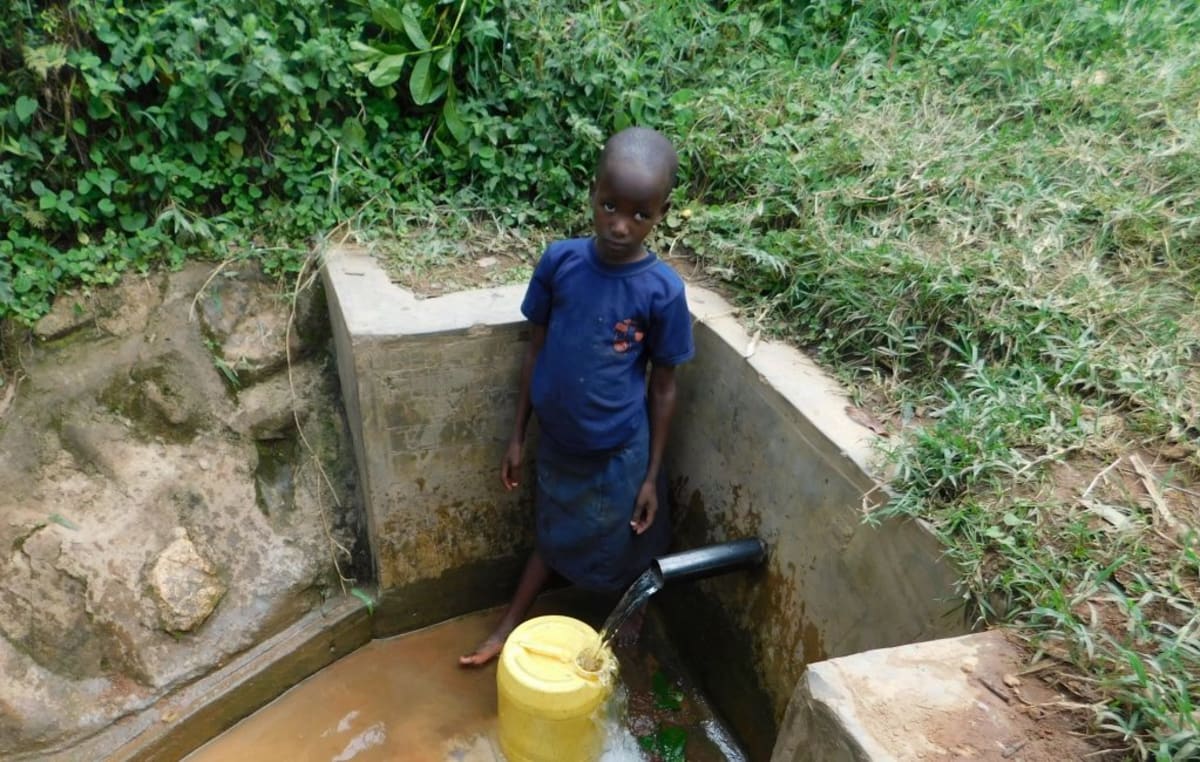A normal day in Maganyi starts early in the morning as people begin to work on their farms. Many people in this community grow tea and sugarcane to earn as much money as possible - they are sold to local factories. Cereals and various vegetables are planted to feed the community.
Water Situation
Community members say that Bebei Spring has been flowing with water ever since they settled in the area in the early 1970s. They've done their best to take care of their water source. At one point, they raised enough money to buy a few bags of cement. They gathered stones and built a wall in which they placed a discharge pipe. However, the water's erosion quickly wore away what they had constructed.
Now, the discharge pipe comes loose every so often as children play around the spring. When that happens, community members must fetch their water by dunking their containers in what has pooled there. Fetching water is much easier when the discharge pipe is in place; the jerrycan is held up under the stream until filled.
Though this pipe makes things more convenient, it has not made the water safer. The community doesn't know how to protect the spring up to that point. Bebei Spring is open to all sorts of contamination, gets worse during the rainy season. Waterborne diseases are often reported after people drink this water.
Sanitation Situation
Most families living around Bebei Spring have at least a basic pit latrine. These are made of mud walls, wood floors, and iron roofs. Those who do not have their own pit latrine often share with a neighbor. Nobody has a hand-washing station anywhere, not even outside the latrine.
Here's what we can do:
Training
Community members will attend hygiene and sanitation training for at least two days. This training will ensure participants have the knowledge they need about healthy practices and their importance. The facilitator plans to use PHAST (Participatory Hygiene and Sanitation Transformation), CLTS (Community-Led Total Sanitation), ABCD (Asset-Based Community Development), group discussions, handouts, and demonstrations at the spring. One of the most important topics we plan to cover is the handling, storage, and treatment of water. Having a clean water source will be extremely helpful, but it is useless if water gets contaminated by the time it’s consumed. Hand-washing will also be a big topic.
Training will also result in the formation of a committee that will oversee operations and maintenance at the spring. They will enforce proper behavior around the spring and delegate tasks that will help preserve the site, such as building a fence and digging proper drainage. The fence will keep out destructive animals, and the drainage will keep the area’s mosquito population at a minimum.
Community members have already told us that they're extremely excited for the chance to learn new things.
Sanitation Platforms
On the final day of training, participants will select five families that should benefit from new latrine floors.
Training will also inform the community and selected families on what they need to contribute to make this project a success. They must mobilize locally available materials, such as bricks, clean sand, hardcore, and ballast. The five families chosen for sanitation platforms must prepare by sinking a pit for the sanitation platforms to be placed over. All community members must work together to make sure that accommodations and food are always provided for the work teams.
Spring Protection
Protecting the spring will ensure that the water is safe, adequate and secure. Construction will keep surface runoff and other contaminants out of the water. With the community’s high involvement in the process, there should be a good sense of responsibility and ownership for the new clean water source.
Fetching water is predominantly a female role, done by both women and young girls. Protecting the spring and offering training and support will, therefore, help empower the female members of the community by giving them more time and efforts to engage and invest in income-generating activities.
This project is a part of our shared program with Western Water And Sanitation Forum (WEWASAFO). Our team is pleased to provide the reports for this project (edited for readability) thanks to the hard work of our friends in Kenya.

 Protected Spring
Protected Spring
 Rehabilitation Project
Rehabilitation Project





































